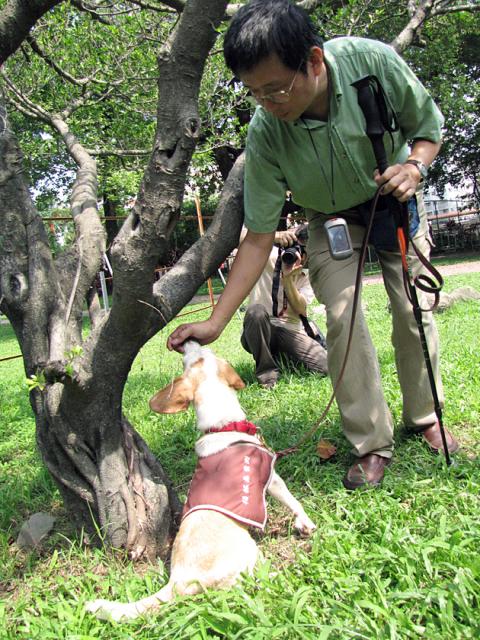Sniffer dogs trained by National Pingtung University of Science and Technology sniffed out brown root rot disease in trees on Wednesday, a feat their trainer described as globally unprecedented.
Brown root rot disease, caused by Phellinus noxius, was reported to be affecting trees in Chungshan Park (中山公園) in Pingtung County, and park officials asked the university to use its trained dogs to help find out exactly how many trees were infected.
Dog trainer Chi Wei-lien (祁偉廉) brought two beagles to the park and led them around each tree.

Photo: CNA
When the dogs detected a sick tree, they sat down on the infected roots and waited for Chi to give them a treat as a reward.
“Within just six seconds, the dogs were able to sniff out the location of the brown root rot,” Chi said, adding that he had not heard of dogs anywhere else in the world able to do that.
The idea to train the dogs came from the use of canines by truffle hunters. From this, Chi inferred that every type of fungus, including Phellinus noxius, has its own distinct scent. He then started training three beagle bitches, aged about five, using Phellinus noxius grown in the lab.
Energy and a fondness for eating are the top requirements when selecting dogs for the task, he said.
With more than 1,000 trees in the park, Chi said he expected it to take about three days to finish examining all of them.
Pingtung County Commissioner Tsao Chi-hung (曹啟鴻) also visited the park to learn about the extent of the infection. Sick trees must be cut down to prevent them from falling over and hurting people, he said.
Officials from the county’s Public Works Department said they are hopeful the dogs will identify the infected trees before the disease runs rampant in the park.

PRAISE: Japanese visitor Takashi Kubota said the Taiwanese temple architecture images showcased in the AI Art Gallery were the most impressive displays he saw Taiwan does not have an official pavilion at the World Expo in Osaka, Japan, because of its diplomatic predicament, but the government-backed Tech World pavilion is drawing interest with its unique recreations of works by Taiwanese artists. The pavilion features an artificial intelligence (AI)-based art gallery showcasing works of famous Taiwanese artists from the Japanese colonial period using innovative technologies. Among its main simulated displays are Eastern gouache paintings by Chen Chin (陳進), Lin Yu-shan (林玉山) and Kuo Hsueh-hu (郭雪湖), who were the three young Taiwanese painters selected for the East Asian Painting exhibition in 1927. Gouache is a water-based

A magnitude 4.1 earthquake struck eastern Taiwan's Hualien County at 2:23pm today, according to the Central Weather Administration (CWA). The epicenter of the temblor was 5.4 kilometers northeast of Hualien County Hall, at a depth of 34.9 km, according to the CWA. The earthquake's intensity, which gauges the actual effect of a temblor, was the highest in Hualien County, where it measured 2 on Taiwan's 7-tier intensity scale. The quake also measured an intensity of 1 in Yilan county, Taichung, Nantou County, Changhua County and Yunlin County, the CWA said. There were no immediate reports of damage or injuries.

OFF-TARGET: More than 30,000 participants were expected to take part in the Games next month, but only 6,550 foreign and 19,400 Taiwanese athletes have registered Taipei city councilors yesterday blasted the organizers of next month’s World Masters Games over sudden timetable and venue changes, which they said have caused thousands of participants to back out of the international sporting event, among other organizational issues. They also cited visa delays and political interference by China as reasons many foreign athletes are requesting refunds for the event, to be held from May 17 to 30. Jointly organized by the Taipei and New Taipei City governments, the games have been rocked by numerous controversies since preparations began in 2020. Taipei City Councilor Lin Yen-feng (林延鳳) said yesterday that new measures by

‘WORSE THAN COMMUNISTS’: President William Lai has cracked down on his political enemies and has attempted to exterminate all opposition forces, the chairman said The legislature would motion for a presidential recall after May 20, Chinese Nationalist Party (KMT) Chairman Eric Chu (朱立倫) said yesterday at a protest themed “against green communists and dictatorship” in Taipei. Taiwan is supposed to be a peaceful homeland where people are united, but President William Lai (賴清德) has been polarizing and tearing apart society since his inauguration, Chu said. Lai must show his commitment to his job, otherwise a referendum could be initiated to recall him, he said. Democracy means the rule of the people, not the rule of the Democratic Progressive Party (DPP), but Lai has failed to fulfill his